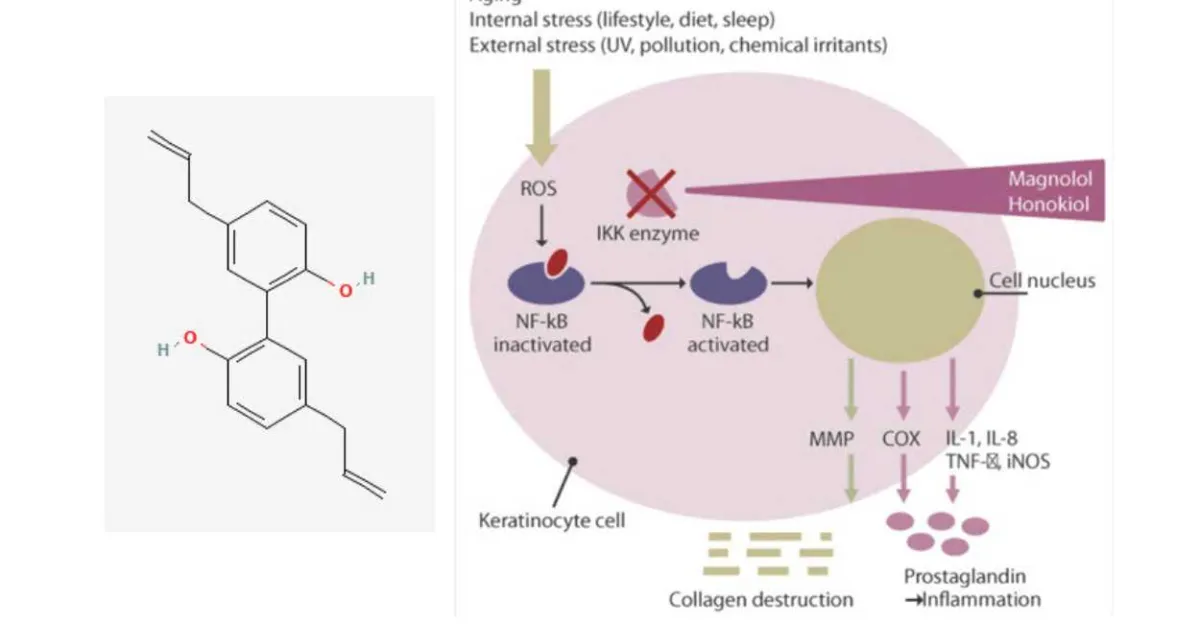 Vinay Kumar Singh.
Vinay Kumar Singh.
Head-Formulation
Kumar Organic Products Research Centre Pvt. Ltd.,
Bengaluru
Email : formulation_krc@kopresearchcentre.net
Magnolol (Kopnolia) is a naturally occurring polyphenolic compound, specifically a lignan, found in the bark of Magnolia species like Magnolia officinalis and Magnolia grandiflora. It exhibits various activities like antioxidant, anti-inflammatory, and antimicrobial properties, anti-aging and has been explored for its potential anticancer and anti-neurodegenerative effects.
The global Magnolia bark extract market is a growing industry, with a projected value of USD 22.14 billion by 2026, driven by factors like population growth, increasing availability, and wide use in the pharmaceutical industry. The market is experiencing a boom, with a Compound Annual Growth Rate (CAGR) of 3.8% during the forecast period.
Key Drivers :
• Increasing Population :
A larger global population means more demand for products containing Magnolia bark extract, including pharmaceuticals and supplements.
• Ease of Availability :
Improved production and distribution networks make Magnolia bark extract more accessible globally.
Its chemical structure is :

Magnolol,is 5,5’-diallyl-2,2’biphenyldiol,a biphenyl structure containing two allyl groups beneficial for increasing the affinity towards endothelial cells. It is known to possess some special abilities like,it inhibits NF-kB pathways, NADPH oxidase, and activates the retinoid receptor, glucathione-5-transferase and other anti-oxidative enzymes. It acts as antioxidant to suppress the oxidation of low-density lipoprotein because of high radical-scavenging activities.
Magnolia Officinalis Bark Extract, effective in reducing Irritation, allergic reaction, skin redness, rash with inhibition of protein NF-kBand the function of this protein which is automatically generated When the skin is allergic, irritated or inflamed.
An image explaining the formation of proteins. NF-kB and the work of Magnolol + Honokiol that inhibits NF-kB.

Magnolol is increasingly used in cosmetics due to its antioxidant, anti-inflammatory, and anti-microbial properties. It helps protect skin against free radicals, reduces inflammation, and can act as an antimicrobial agent.
Benefits of Magnolol in Cosmetics :
• Antioxidant : Magnolol effectively scavenges free radicals, protecting the skin from damage and contributing to anti-aging benefits.
• Anti-inflammatory : It helps soothe sensitive skin, reduce redness, and alleviate irritation.
• Anti-microbial : Magnolol can help combat acne-causing bacteria and other microorganisms.
• UV Protection : Studies suggest that magnolol may help supplement sunscreen protection against UV radiation.
• Anti-aging : By reducing inflammation and oxidative stress, magnolol can contribute to a more youthful appearance.
• Other potential benefits: Magnolol may also help with skin whitening, oil control, and reducing hyperpigmentation.
Applications of Magnolol in Cosmetics :
Magnolol can be found in a variety of cosmetic products, including:
• Facial care : Creams, serums, and masks.
• Body care : Lotions, oils, and balms.
• Oral care : Toothpastes and mouthwashes.
• Hair care : Shampoos and conditioners.
Safety and Usage :
Magnolol is generally considered safe for topical use. When incorporating magnolol into cosmetic formulations, it's recommended to :
• Use in combination with other ingredients: Magnolol can be combined with other ingredients to enhance its benefits and create well-rounded formulations.
• Consider solubility: Magnolol is more soluble in glycerin or other solvents.
• Store properly: Store magnolol in a cool, dark place to maintain its potency.
• Follow recommended usage rates: Typically, 0.1-1.0% is recommended for topical applications.
Magnolol contains anti-inflammatory properties that can help to alleviate skin conditions such as rosacea and eczema. Magnolia bark extract also has antimicrobial properties that can help to prevent the growth of bacteria on the skin, reducing the risk of breakouts and infections.
The extract has a strong antimicrobial, antibacterial and anti-inflammatory effect. Used in acne treatment, Magnolia Extract is very effective against acne-causing germs without irritating the skin.
Magnolol may contribute to barrier function improvement on imiquimod induced psoriasis like dermatitis animal model.
Magnolol can protect skin against chronic inflammation, neutralize internal aging factors and reduce skin redness. Magnolol may be applied in protective formulas, anti-aging for face and eye contour and for anti-redness skin care.









